名词性从句常见错误例析
常见病句类型之名词性从句缺失如何改正

常见病句类型之名词性从句缺失如何改正名词性从句是英语语法中的一种重要句型,它在句子中充当名词的作用。
然而,在语言表达中,我们常常会遇到名词性从句缺失的问题,导致句子不够完整或表达不准确。
本文将针对常见的名词性从句缺失进行分析,并介绍如何改正这些错误,以帮助读者有效避免病句的产生。
一、缺少主语从句主语从句在句子中充当主语的作用,常常是由连接词如“that”或“whether/if”引导的。
当我们省略主语从句时,句子变得不完整且含义不清晰。
以下是一个例子:1. 原句:It is important to exercise regularly.改正:Whether we exercise regularly is important.二、缺少宾语从句宾语从句出现在句子中作为动词的宾语,常由连接词引导。
当我们省略宾语从句时,会导致句子意思不明确。
以下是一个例子:2. 原句:I think it's necessary.改正:I think that it's necessary.三、缺少表语从句表语从句在句子中充当表语的作用,常由连接词引导。
当我们省略表语从句时,会导致句子表达不准确。
以下是一个例子:3. 原句:The important thing is to stay positive.改正:The important thing is that we stay positive.四、缺少同位语从句同位语从句用于进一步解释或说明名词意义,常常由连接词引导。
当我们省略同位语从句时,会导致对名词意义的理解不准确。
以下是一个例子:4. 原句:The fact was surprising.改正:The fact that he won the award was surprising.五、缺少宾语补足语从句宾语补足语从句在句子中充当宾语补足语的作用,常由连接词引导。
当我们省略宾语补足语从句时,会导致宾语的含义不完整。
名词性从句之典型例析
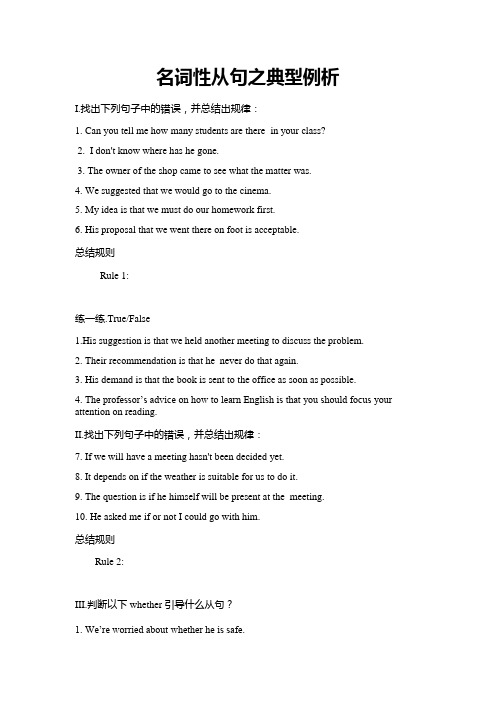
名词性从句之典型例析I.找出下列句子中的错误,并总结出规律:1. Can you tell me how many students are there in your class?2. I don't know where has he gone.3. The owner of the shop came to see what the matter was.4. We suggested that we would go to the cinema.5. My idea is that we must do our homework first.6. His proposal that we went there on foot is acceptable.总结规则Rule 1:练一练.True/False1.His suggestion is that we held another meeting to discuss the problem.2. Their recommendation is that he never do that again.3. His demand is that the book is sent to the office as soon as possible.4. The professor’s advice on how to learn English is that you should focus your attention on reading.II.找出下列句子中的错误,并总结出规律:7. If we will have a meeting hasn't been decided yet.8. It depends on if the weather is suitable for us to do it.9. The question is if he himself will be present at the meeting.10. He asked me if or not I could go with him.总结规则Rule 2:III.判断以下whether 引导什么从句?1. We’re worried about whether he is safe.2. wh ether she is married I don’t know.3. It matters little whether he likes it or not.4. The question is whether he should do it.5.The doctor can hardly answer the question whether the old man will总结规则Rule 3:IV.找出下列句子中的错误,并总结出规律:1.I think that worthwhile that we spent so much money on these books.2. That is hard to decide when and where we will held our sports meeting.3. Everybody considers it impossible which he wants to finish the job in such a short time.4. It doesn’t matter that you will come or not.总结规则Rule 4:V.找出下列句子中的错误,并总结出规律:1.What made the school proud was what more than 90% of the students had been admitted to key universities.2. Are the shoes that you bought yesterday?3. What men have learned much from the behavior of animals is hardly new.总结规则Rule 5:VI.填填看1. By success I don't mean ____is usually thought of when that word is used .2. ______ he wants to go there is obvious.3.The result is ______ we won the game.4.This is _____ we want to know.5.Is _____ he told us true ?6.We should pay attention to ______ the teacher is saying.7. I have no idea _____ he did that afternoon.总结规则Rule 6:。
名词性从句经典错误解析
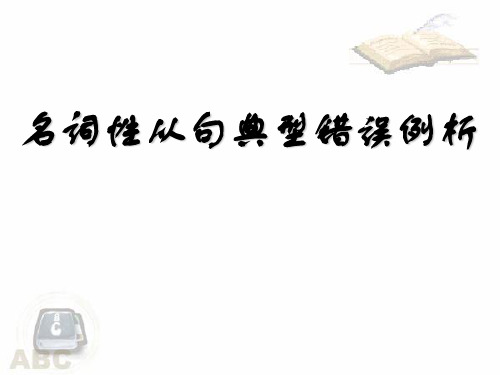
找出下列句子中的错误,并总结出规律:
7. If we will have a meeting hasn't been decided yet. Whether we will have a meeting hasn’t been decided yet. 8. It depends on if the weather is suitable for us to do it. It depends on whether the weather is …...
9. The question is if he himself will be present at the meeting. The question is whether he himself will be present …...
10. He asked me if I could go with him or not. He asked me whether I could go with him or not. 规律三:4种情况只能用whether : (1)位于句子开头; (2)前面有介词; (3)引导表语从句; (4)与or not连用(书)
for several years.
12. 1980, when Chinese government began its
reform, is an important year for China.
结论二: 定语从句的引导词在语义上具有 指代先行词的作用。
名词从句的引导词不具备此功能。
3. 关于that:
找出下列句子中的错误,并总结出规律: 4. We suggested that we would go to the cinema. We suggested that we (should) go to the cinema.
名词性从句常见错误例析
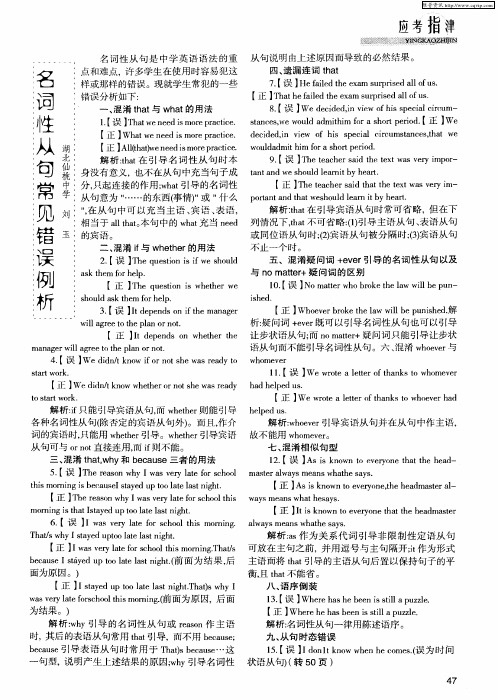
8【 】 ei d n i s pc li u - . 误 We c e , e o h ei r m d d i v w f is a cc s cs e 0I am t mf so e o. 正 】 t e. u d i i r rpr d 【 n a w w d h o a ht i We
ha e p d US dh le .
【 】 int nw w e e o s e a ay 正 We d /k o h t r r t h s ed d h on w r
维普资讯 ຫໍສະໝຸດ 应 考指沣 一 一 一 一 一 一 一
: C7
-.
= = 】
:
J : u
名 词性 从 句 是 中学 英 语 语 法 的重 从 句说 明 由上述 原 因而 导致 的必 然结 果 。 四 、 漏连 词 ta 遗 ht : 点和难点, 许多学生在使用时容易犯这 样或那样的错误。现就学生常犯的一些 7【 】 eae e xmsrr e lf s .误 H id h a pi d l u. fl t e u s a o 【 】 ht eae e xmsrre lf S 正 T a h i dh a p i d loU. fl t e u s a : 误分 析如下 : 错
d cde ,n iw o h s p c a c r u t c st a we e i d i ve f i s e il ic msa e , t n h
从
: : I
湖:
d th m h t p i o 【 A(tee i opce woul adm i i fras or erod. 正】l a nes r rt . l ) d m e ai tw h c
名词性从句重难点剖析
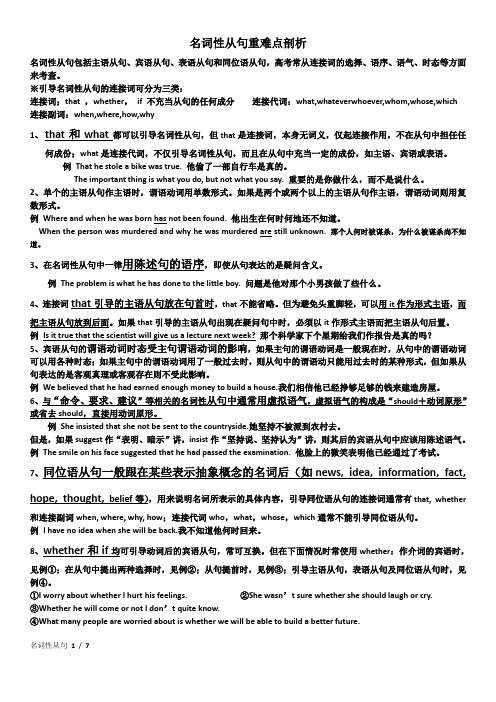
名词性从句重难点剖析名词性从句包括主语从句、宾语从句、表语从句和同位语从句,高考常从连接词的选择、语序、语气、时态等方面来考查。
※引导名词性从句的连接词可分为三类:连接词;that ,whether,if 不充当从句的任何成分连接代词:what,whateverwhoever,whom,whose,which连接副词:when,where,how,why1、that和what都可以引导名词性从句,但that是连接词,本身无词义,仅起连接作用,不在从句中担任任何成份;what是连接代词,不仅引导名词性从句,而且在从句中充当一定的成份,如主语、宾语或表语。
例That he stole a bike was true. 他偷了一部自行车是真的。
The important thing is what you do, but not what you say. 重要的是你做什么,而不是说什么。
2、单个的主语从句作主语时,谓语动词用单数形式。
如果是两个或两个以上的主语从句作主语,谓语动词则用复数形式。
例Where and when he was born has not been found. 他出生在何时何地还不知道。
When the person was murdered and why he was murdered are still unknown. 那个人何时被谋杀,为什么被谋杀尚不知道。
3、在名词性从句中一律用陈述句的语序,即使从句表达的是疑问含义。
例The problem is what he has done to the little boy. 问题是他对那个小男孩做了些什么。
4、连接词that引导的主语从句放在句首时,that不能省略。
但为避免头重脚轻,可以用it作为形式主语,而把主语从句放到后面。
如果that引导的主语从句出现在疑问句中时,必须以it作形式主语而把主语从句后置。
例Is it true that the scientist will give us a lecture next week? 那个科学家下个星期给我们作报告是真的吗?5、宾语从句的谓语动词时态受主句谓语动词的影响,如果主句的谓语动词是一般现在时,从句中的谓语动词可以用各种时态;如果主句中的谓语动词用了一般过去时,则从句中的谓语动只能用过去时的某种形式,但如果从句表达的是客观真理或客观存在则不受此影响。
名词性从句改错
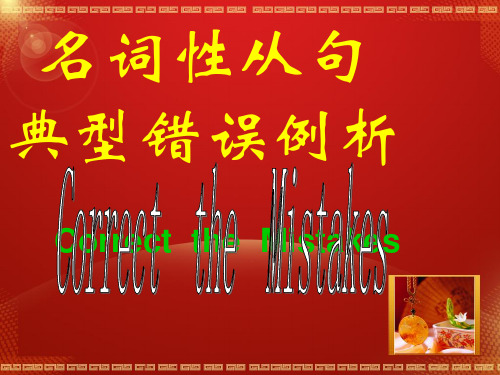
Correct the Mistakes
1. As is known to all that paper was first invented in China. 2. All the students went to see what the matter was with her. 3. We don't doubt whether he can do a good job. 4. Are the shoes that you bought yesterday? 5. The reason why I like the dictionary is because it is useful for my work. 6. This surprised us very much that Tom should have left without a word. 7. The question is if the film is worth seeing.
Analysis
1. As is known to all that paper was first invented in China. 引导的从句是主语从句, 作形式主语时, 析:that引导的从句是主语从句,用it作形式主语时, 引导的从句是主语从句 作形式主语时 应把as改为 改为it,或者原句改为定语从句: 应把 改为 ,或者原句改为定语从句:As is known to all, paper was first invented in China. 2. All the students went to see what the matter was with her. 应把what the matter was改为 改为what was the 析:应把 改为 matter.what was the matter (with)和what was . 和 wrong (with)作宾语从句时语序不变. 作宾语从句时语序不变. 作宾语从句时语序不变 3. We don't doubt whether he can do a good job. 当谓语动词是doubt时,应用 析:当谓语动词是 时 应用whether/if引导宾语 引导宾语 从句, 从句,而do not doubt (= believe) 和疑问句中的 doubt用that引导宾语从句,应把 引导宾语从句, 改为that. 用 引导宾语从句 应把whether改为 改为
高中英语名词性从句典型错误例析
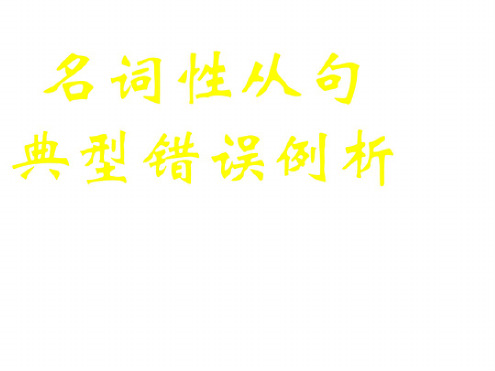
ladbrokes官方网 [多选]标准摇酒壶的容量有()A.250mlB.350mlC.530mlD.210mlE.420ml [问答题,简答题]为什么在培训过程中的每个阶段都要重视评估问题? [单选,A1型题]真核生物的mRNA应该是()A.在胞质内合成和发挥其功能B.帽子结构是一系列的腺苷酸C.有帽子结构和聚A尾巴D.mRNA能携带遗传信息,所以可长期存在E.mRNA的前身是rRNA [单选]空气中水分含量约为()空气A.3-30g/m3空气B.2-20g/m3空气C.4-40g/m3空气 [判断题]国家以协议方式将国有土地使用权在一定年限内出让给土地使用者,土地使用者必须向国家支付土地使用权出让金。()A.正确B.错误 [单选]下列哪一项不是胎儿十二指肠闭锁的超声表现A.双泡征B.双泡征中大的无回声区是胃泡C.双泡征中小的无回声区是十二指肠D.羊水过多E.结肠扩张 [单选]()系数可用来检查整个炼焦车间全面的工作情况A.K总B.K计C.K安定 [单选]“甜蜜的声音”、“沉重的脚步”都是()A.对比B.联觉C.心境D.表情 [单选]使用“货运票据封套”的(),应左右对齐折叠。A、装载清单B、货物运单和货票C、证明文件D、杂费收据 [单选,A1型题]引起胰岛素抵抗性的诱因,哪项错误()。A.严重创伤B.酮症酸中毒C.并发感染D.手术E.暴饮暴食 [单选]连续观测航行前方航道一侧某浮标的舷角导航,如发现该浮标的舷角逐渐增大,则表明()。A.船舶行驶在计划航线上B.船舶行驶在该浮标所标示的航道安全一侧C.船舶可能将偏离航道,进入航道另一侧的浅水区D.以上都可能 [单选]下列卵巢皮样囊肿声像图的表现,哪一项是错误的A.脂液分层征B.面团征C.瀑布征D.杂乱结构征E.实性团块征 [单选]测量煤线应在()时进行。A.平煤前B.平煤中C.平煤后 [单选]发生车种代用装车时,应采取保证()的相应措施。A、车辆安全B、货物数量C、货物质量D、货物安全 [单选]排水沟沿道路布置时,纵坡至少不得小于()。A.0.2%B.0.4%C.0.6%D.0.8% [名词解释]秩边 [单选]关于入境展览品,以下表述正确的是:A.无需办理报检手续B.入境动植物展品免于检疫审批C.展览期间应接受检验检疫监管D.留购得展品无需重新办理报检手续 [单选,A1型题]静脉高营养对下列哪种病因引起的肠瘘疗效差()A.高排出量肠瘘远侧有梗阻B.放射性C.异物性D.上皮化窦道E.肿瘤 [判断题]办理外币储蓄业务,存款本金和利息可以用外币支付,也可以按当日外汇汇率折计为人民币支付。()A.正确B.错误 [单选]当溜煤眼和煤仓堵塞时,可用()进行爆破处理。A.铵梯炸药B.岩石乳化炸药C.煤矿许用刚性被筒炸药 [单选]大脑中动脉深穿支闭塞的最常见表现是()A.四肢瘫痪,双侧面瘫,不能言语,不能进食,只有眼球上下运动B.眼球震颤,同侧Homner征,交叉性感觉障碍,同侧小脑性共济失调C.对侧偏瘫,无感觉障碍及偏盲,优势侧伴失语D.对侧偏瘫,偏身感觉障碍,同向偏盲E.对侧偏瘫,深感觉障碍 疼痛 [单选,A1型题]在生产实践中可人工控制猪在白天集中分娩的生殖激素是()A.PGF2aB.PMSGC.HCGD.OTE.GnRH [单选]关于卡泊芬净,叙述错误的是()A.棘白菌素类代表药B.作用于细胞膜C.不良反应少于伊曲康唑D.不良反应少于伏立康唑E.首剂70mg,静脉注射 [单选,A2型题,A1/A2型题]治疗放射性核素内污染,促进钚、钍、铯等核素排泄的首选药物为()。A.二巯基丙磺钠(Na-DMPS)B.二巯丁二酸(DMSA.C.二巯基丁二钠(Na-DMS)D.依地酸钙钠(CaNa2-EDTA.E.喷替酸钙钠(CaNa3-DTPA. [单选]倾斜井巷倾角大于()时,必须在耙装机司机前方打护身柱或设挡板。A.15°B.20°C.25°D.30° [单选]()是指企事业单位内从事各种专业技术工作的个人可能因工作上的失误导致的损害赔偿责任。A、AB、BC、CD、D [单选]广东点心中的白糖伦教糕、萝卜糕等都是以()为原料之一,磨成粉、浆后制作而成A、籼米B、糯米C、江米D、粳米 [单选]误服敌百虫中毒时忌用哪种溶液洗胃()A.1:5000高锰酸钾B.温开水C.4%碳酸氢钠D.生理盐水E.以上均是 [单选,A1型题]关于前列腺增生(BPH)的鉴别诊断,不包括()A.神经源性膀胱B.膀胱颈挛缩C.前列腺癌D.尿道狭窄E.膀胱憩室 [问答题,简答题]《药品生产质量管理规范》的具体实施办法、实施步骤由那个部门规定? [单选]石油凝固点高低与其()量有关。A.蜡B.胶质C.硫D.碳 [单选]对烟酸缺乏症治疗的D.去除和治疗病因 [单选]下列有关肺癌的描述中,哪项是正确的()A.肺癌患者有同侧和隆突下淋巴结转移约占75%B.胸腔积液一般为淡黄色C.鳞癌一般位于肺门周围,对射线不敏感D.腺癌恶性程度高,对射线敏感E.肺癌女性多见 [单选]“夫百病之始生也,皆生于风雨寒暑,清湿喜怒”之“清湿”是指()。A.湿邪B.风湿C.痰湿D.寒湿E.湿热 [填空题]登高人员穿着要求:()。 [单选]()接口是HLR和MC间的接口。A.AB.BC.CD.N [单选,A2型题,A1/A2型题]以下关于正常妇女双合诊检查的描述,正确的是()A.双手同时放入阴道检查B.均有宫颈抬举痛C.可触到输卵管D.子宫固定E.一般触不到卵巢 [单选]女,41岁,阵发性头痛伴恶心、呕吐20余天,MRI影像如图,最可能的诊断为()A.双侧筛窦息肉B.双侧筛窦炎C.双侧筛窦未见明显异常D.双侧筛窦真菌感染E.双侧筛窦过敏性炎症 [单选]以合同的成立是否以标的物的交付为必要条件为标准划分,合同可以分为()。A.双务合同和单务合同B.诺诚合同和实践合同C.主合同和从合同D.有名合同和无名合同 [多选]港口与航道工程的图纸会审,参加单位应包括()。A.总包施工单位B.分包施工单位C.设计单位D.质检单位E.监理单位
名词性从句典型错误例析
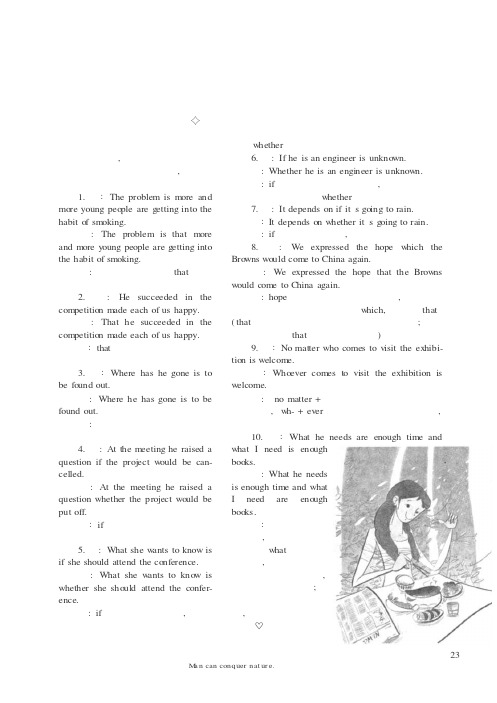
名词性从句是中学阶段必须掌握的语法内容,这里针对学生们常犯的错误进行如下归纳和分析,希望能对同学们有所帮助。
1.误:The problem is more and mo re young peo ple are g etting into the habit o f smoking.正:The problem is that more and more y oung people are g etting into the habit of smoking.析:引导表语从句的that在书面语中不可省略。
2.误:He succeeded in the competitio n made each of us happy.正:That he succeeded in the competitio n made each of us happy.析:that引导主语从句时不能省略。
3.误:Where has he gone is to be fo und out.正:Where he has gone is to be found out.析:名词性从句应该用陈述语序。
4.误:At the meeting he raised a question if the project w ould be can-celled.正:At the meeting he raised a question whether the project wo uld be put off.析:if不能用来引导同位语从句。
5.误:What she w ants to know is if she should attend the co nference.正:What she w ants to kno w is whether she sho uld attend the confer-ence.析:if不能引导表语从句,表示“是否”的意义引导表语从句的连结词要用w hether。
名词性从句典型错误例析
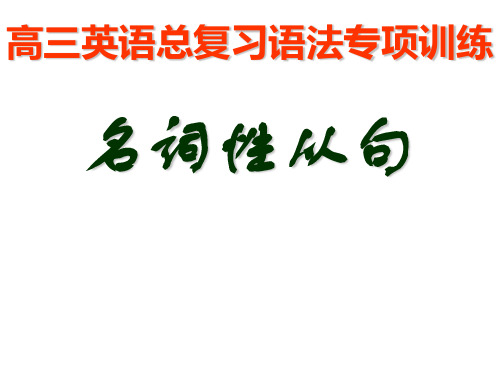
It depends on whether we have enough time. They don’t know whether to go there . Please come to see me if you have time .
同位语从句
同位语从句在句中作某一名词的同位语, 一般位于该名词 如news,fact,idea ,suggestions, promise等的后面,说明该名词的内容。 I have no idea when he律:
1. I think that worthwhile that we spent so much money it on these books. 2. That is hard to decide when and where we will held our it sports meeting. 3. Everybody considers it impossible which he wants to finish the job in such a short time. that 4. It doesn’t matter that you will come or not. whether
找出下列句子中的错误,并总结出规律:
7. If we will have a meeting hasn't been decided yet. Whether we will have a meeting hasn’t been decided yet. 8. It depends on if the weather is suitable for us to do it. It depends on whether the weather is …...
初中英语名词性从句详解
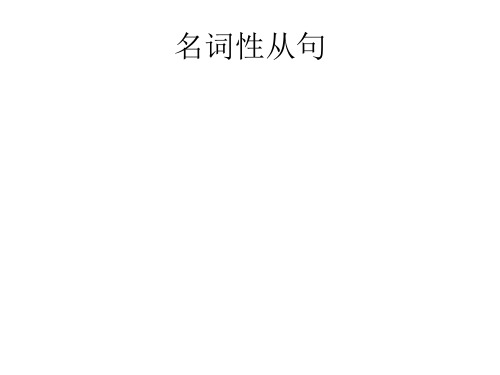
she was worried • The reason lies in that she works harder
than the others do
同位语从句
同位语从句说 明它们的内容
被修饰词有: fact; news; hope; opinion; order; question; problem; belief; truth; theory; decision; discovery; conclusion; promise; rumor; fear; thought; suggestion; plan; idea…
比较: The man looked around 那人看了看四周 名词作主语
That the boy failed again in the exam disappointed his mother
那孩子考试又不及格令他母亲很失望 从句作主语
同样作主语;从句可以表示较复杂的含义;一般是个动作或性质
that 一般不省略
2 The question is whether w can finish the experiment by Friday 问题在于我们能否在明天下午之前完成这项实验 表语从句不用 if
3 It looks as if it were going to rain as if /as though从句常表示
3. 这就是我们上星期碰头的地方
This is where we met last Sunday
This is 总是现在时 That is 表示性质 That was 指过去动作
名词性从句学生常犯错误例析

提示 : 意不要把 名词性 从句 与定语 注 从句 , 混淆 定语 从句有 先 行词 而名词 性从 句 无先{ 词( 亍 同位语从句除外)另外 . 。 同位语从 句是解释说明从句前 名词的具体 内容而定 语从句是修饰名词的。
一
jb — — yu ae dig sm tig sr u o o r on o e n ei s h o b tneet g f0 9 京 1 u it sn .2 0 北 r i
A.wh r ee
C.wh n e
B.wh c ih
D h t t a
I d p n so t e e d n
一
天津 )
A.wh t a C. ha t t B.whih c D.h w o
、
解 析 : 题 考 查 宾 语 从 句 , 宾 语 从 句 此 此
y u a e t rs n;y u a n t e u e f o h v a p e e t o c n o b s r o
w e :何 时 ” “ …… 的时候 ” h m h n“ ,所 ( et e t i w e) hn
wh r: ee “哪 儿 ” “所 … … 的 地 方 ” te . f h
pa ew ee lc h r)
wlt epaei B in . i k l e ig la c n j 【 4 A moenct h sb e e u 例 】 d r i a enst pi y n
解 析 : 生 易 误选 A, 它 当成 了定 语 学 把 从句。 此题考 查宾语从 句 , 语从句 缺表语 , 宾 故 选 C 意思 是 “ 么 ” , 什 。句意 为 :你能 帮 我 “ 个 忙 吗 ? 那 要 看 是 什 么 事 ” 。
高考英语名词性从句解析
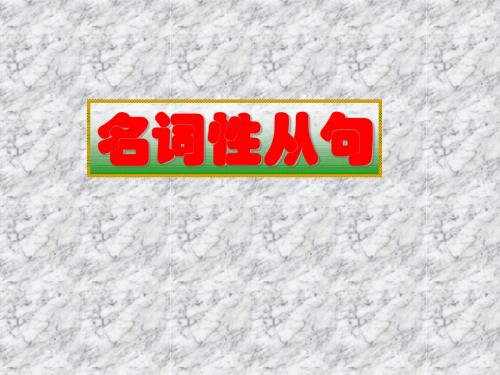
五.同位语从句
1.同位语从句的引导词主要是: 1.同位语从句的引导词主要是: that 同位语从句的引导词主要是 2.同位语从句和定语从句的区别 同位语从句和定语从句的区别: 2.同位语从句和定语从句的区别: 如果that作从句中的某一成分 则是定语从句 如果 作从句中的某一成分,则是定语从句 如果 作从句中的某一成分 则是定语从句,如果 that不作从句中的任何成分 则是同位语从句 不作从句中的任何成分,则是同位语从句 不作从句中的任何成分 则是同位语从句. 例: (1) I had no idea that it was so late. (主系表 主系表 结构,that 不作从句中的成分 同位语从句 不作从句中的成分,同位语从句 同位语从句) 结构 (2) I still remember the place that we visited last year.(主谓宾结构 主谓宾结构,that作从句中的宾 主谓宾结构 作从句中的宾 定语从句) 语,定语从句 定语从句 3.that引导的同位语从句前面的名词常见的有 引导的同位语从句前面的名词常见的有: 3.that引导的同位语从句前面的名词常见的有: idea, fact, news, belief, thought, doubt, suggestion, proof, message, order, conclusion, desire, theory, truth, word (消息)等. 消息)
2.注意点 2.注意点
1) 主语从句一律用陈述语序 即:主语 谓语 主语从句一律用陈述语序,即 主语+谓语 谓语+…. 例: 正: When he will come is not known. 误: Whe接词that在从句中无实际意义 但不能省略 在从句中无实际意义,但不能省略 在从句中无实际意义 但不能省略. 例: 正: That he will not come to the meeting this evening is true. 误: He will not come to the meeting this evening is true.
名词性从句易错点例析
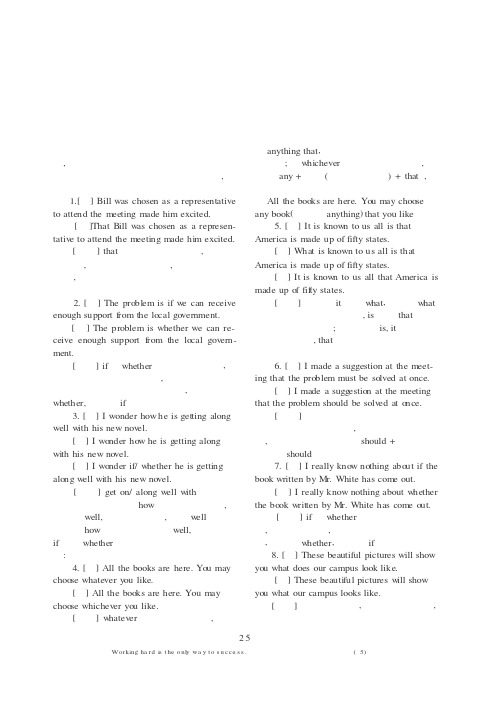
名词性从句是高中语法的一项重要内容,也是高考热点之一。
本文通过正误对比的方式对名词性从句的易错点进行分析,希望对同学们有所帮助。
1.[误]Bill was chosen as a representative to attend the meeting made him excited.[正]That Bill w as chosen as a represen-tativ e to attend the meeting made him excited.[解析]that 引导名词性从句时,不作任何成分,没有任何实际意义,只起连接词的作用,但在主语从句、表语从句和同位语从句中不能省略。
2.[误]The pro blem is if w e can receiveenough support f rom the lo cal go vernment.[正]The problem is whether we can re-ceive enough support f rom the lo cal gov ern-ment.[解析]if 和whether 引导宾语从句时,绝大多数情况都可以互换,但是在引导主语从句、表语从句和同位语从句时,只能用whether ,不能用if 。
3.[误]I wonder how he is getting along well w ith his new nov el.[正]I wo nder ho w he is g etting along with his new no vel.[正]I wo nder if/w hether he is getting alo ng w ell with his new no vel.[解析]get on/along w ell w ith 意为“进展得顺利”。
如果用how 来引导宾语从句,则去掉well ,否则意思重复,既然w ell 就不必再问how 了。
高考总复习英语教师用书语法专项突破7第七讲名词性从句
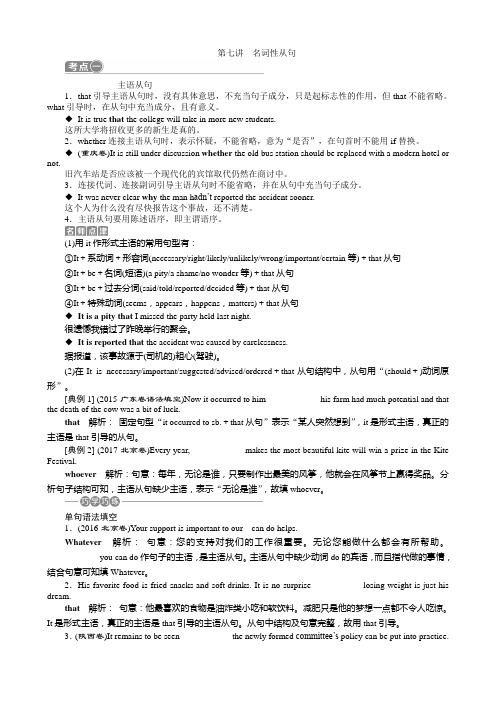
第七讲名词性从句主语从句1.that引导主语从句时,没有具体意思,不充当句子成分,只是起标志性的作用,但that不能省略。
what引导时,在从句中充当成分,且有意义。
◆It is true that the college will take in more new students.这所大学将招收更多的新生是真的。
2.whether连接主语从句时,表示怀疑,不能省略,意为“是否”,在句首时不能用if替换。
◆(重庆卷)It is still under discussion whether the old bus station should be replaced with a modern hotel or not.旧汽车站是否应该被一个现代化的宾馆取代仍然在商讨中。
3.连接代词、连接副词引导主语从句时不能省略,并在从句中充当句子成分。
◆It was never clear why the man h adn’t reported the accident sooner.这个人为什么没有尽快报告这个事故,还不清楚。
4.主语从句要用陈述语序,即主谓语序。
(1)用it作形式主语的常用句型有:①It+系动词+形容词(necessary/right/likely/unlikely/wrong/important/certain等)+that从句②It+be+名词(短语)(a pity/a shame/no wonder等)+that从句③It+be+过去分词(said/told/reported/decided等)+that从句④It+特殊动词(seems,appears,happens,matters)+that从句◆It is a pity that I missed the party held last night.很遗憾我错过了昨晚举行的聚会。
◆It is reported that the accident was caused by carelessness.据报道,该事故源于(司机的)粗心(驾驶)。
名词性从句考点+例题_全面解析(word)(1)
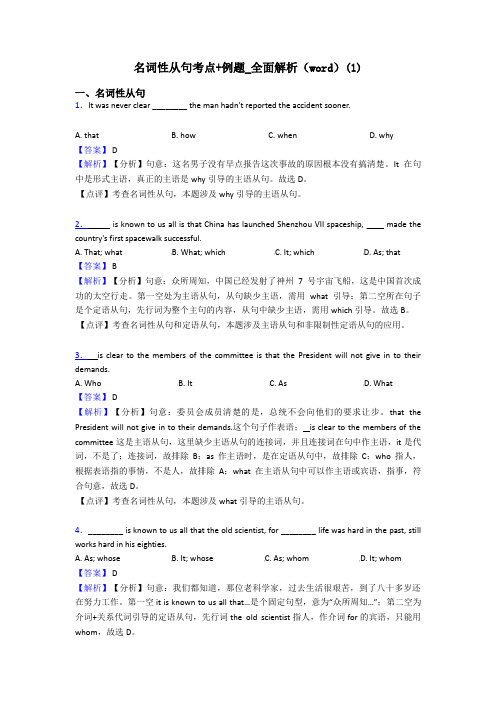
名词性从句考点+例题_全面解析(word)(1)一、名词性从句1.It was never clear ________ the man hadn't reported the accident sooner.A. thatB. howC. whenD. why【答案】 D【解析】【分析】句意:这名男子没有早点报告这次事故的原因根本没有搞清楚。
It在句中是形式主语,真正的主语是why引导的主语从句。
故选D。
【点评】考查名词性从句,本题涉及why引导的主语从句。
2._____ is known to us all is that China has launched Shenzhou VII spaceship, ____ made the country's first spacewalk successful.A. That; whatB. What; whichC. It; whichD. As; that【答案】 B【解析】【分析】句意:众所周知,中国已经发射了神州7号宇宙飞船,这是中国首次成功的太空行走。
第一空处为主语从句,从句缺少主语,需用what引导;第二空所在句子是个定语从句,先行词为整个主句的内容,从句中缺少主语,需用which引导。
故选B。
【点评】考查名词性从句和定语从句,本题涉及主语从句和非限制性定语从句的应用。
3. is clear to the members of the committee is that the President will not give in to their demands.A. WhoB. ItC. AsD. What【答案】 D【解析】【分析】句意:委员会成员清楚的是,总统不会向他们的要求让步。
that the President will not give in to their demands.这个句子作表语; is clear to the members of the committee这是主语从句,这里缺少主语从句的连接词,并且连接词在句中作主语,it是代词,不是了;连接词,故排除B;as作主语时,是在定语从句中,故排除C;who指人,根据表语指的事情,不是人,故排除A;what在主语从句中可以作主语或宾语,指事,符合句意,故选D。
名词性从句常见错误例析
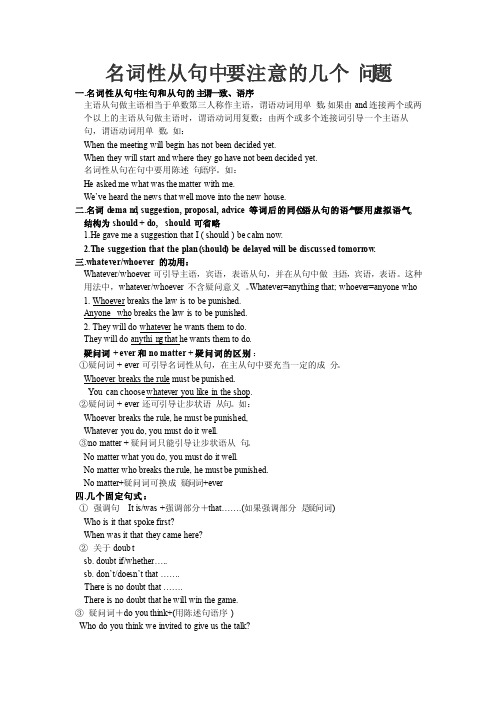
名词性从句中要注意的几个问题一.名词性从句中主句和从句的主谓一致、语序主语从句做主语相当于单数第三人称作主语,谓语动词用单数,如果由and连接两个或两个以上的主语从句做主语时,谓语动词用复数;由两个或多个连接词引导一个主语从句,谓语动词用单数。
如:When the meeting will begin has not been decided yet.When they will start and where they go have not been decided yet.名词性从句在句中要用陈述句语序。
如:He asked me what was the matterwith me.We’ve heard the news that well move into the new house.二.名词d eman d, suggest ion, proposa l, advice等词后的同位语从句的语气要用虚拟语气,结构为 should+ do, should可省略1.He gave me a suggest ion that I ( should) be calm now.2.The suggest ion that the plan (should) be delayed will be discuss ed tomorro w.三.whateve r/whoever的功用:Whateve r/whoever可引导主语,宾语,表语从句,并在从句中做主语,宾语,表语。
这种用法中,whateve r/whoever不含疑问意义。
Whateve r=anythin g that; whoever=anyonewho 1. Whoever breaksthe law is to be punishe d.Anyonewho breaksthe law is to be punishe d.2. They will do whateve r he wants them to do.They will do anythin g that he wants them to do.疑问词 + ever和no matter+ 疑问词的区别:①疑问词 + ever可引导名词性从句,在主从句中要充当一定的成分。
名词性从句
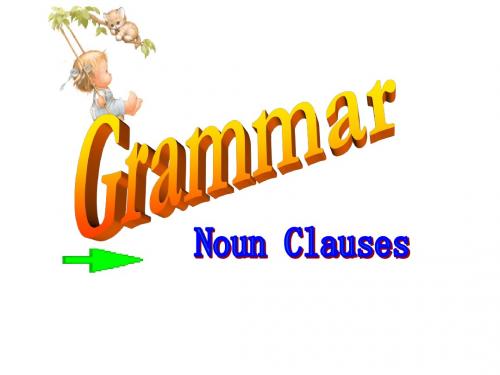
that Do you doubt ______ ---?
I don’t doubt / There is no doubt _______---. that
that I’m sure ______---. Are you sure _______---? that whether/if I’m not sure _____________---.
3/. whether引导的从句可以充当介词宾语,if则不行。 10. ___ he comes or not, we will begin our party on D time A. that B. what C. if D. whether 4/. whether引导让步状语从句,表示“ 不管 ”; “ 不论 ”, 不能由if 取代。
7. ______ the 2008 Olympic Games will be C held in Beijing is not known yet. A. That B. If C. Whether D. Whenever 8. What the doctors really doubt is _____ C my mother will recover from the serious disease soon. A. when B. how C. whether D. why
关系代词 :who、whoever whose、 what、whatever
关系副词: when、whenever where、wherever
why、how、however how long
二、各种连接词的用法:
1. 连接词 that、whether、if as if/though 它们引导的主
探究3: that, whether 与 if
名词性从句常见错误及练习
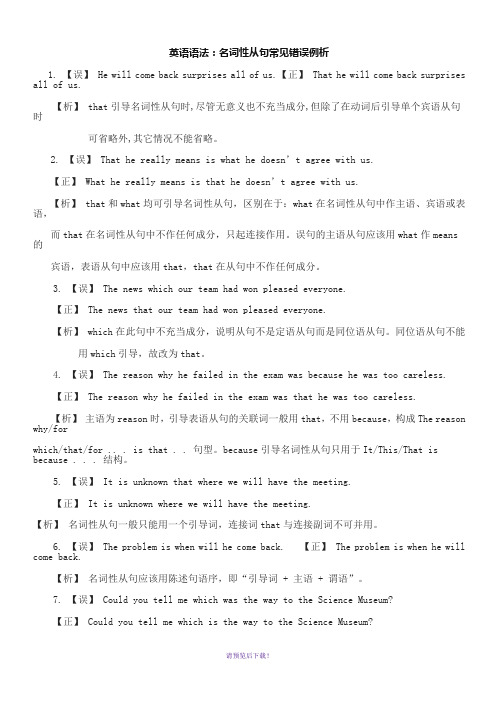
英语语法:名词性从句常见错误例析1. 【误】 He will come back surprises all of us.【正】 That he will come back surprises all of us.【析】 that引导名词性从句时,尽管无意义也不充当成分,但除了在动词后引导单个宾语从句时可省略外,其它情况不能省略。
2. 【误】That he really means is what he doesn’t agree with us.【正】 What he really means is that he doesn’t agree with us.【析】 that和what均可引导名词性从句,区别在于:what在名词性从句中作主语、宾语或表语,而that在名词性从句中不作任何成分,只起连接作用。
误句的主语从句应该用what作means的宾语,表语从句中应该用that,that在从句中不作任何成分。
3. 【误】 The news which our team had won pleased everyone.【正】 The news that our team had won pleased everyone.【析】 which在此句中不充当成分,说明从句不是定语从句而是同位语从句。
同位语从句不能用which引导,故改为that。
4. 【误】 The reason why he failed in the exam was because he was too careless.【正】 The reason why he failed in the exam was that he was too careless.【析】主语为reason时,引导表语从句的关联词一般用that,不用because,构成The reason why/forwhich/that/for .. . is that . . 句型。
高考英语一轮复习:名词性从句

高考英语一轮复习之名词性从句1.从句的分类:名词性从句定语从句状语从句2.名词性从句的定义和分类:定义:在句子中充当名词的从句分类:包括主语从句、宾语从句、表语从句、同位语从句3.宾语从句定义:用作宾语的从句叫宾语从句。
构成:主句+连接词+从句在宾语从句后的括号内打“√”,并分析宾语从句的成分。
1.Bill thinks that the races were not interesting to watch ( )2.Bill wonders whether they’ll have zongzi again next year. ( )3.They carry people’s wishes to the families they love and miss ( )4.He warns Scrooge to change his ways if he doesn’t want to end up like him ( )●引导宾语从句的连接词有三类:①当宾语从句是陈述句时,由that引导,that在从句中不作任何成分,没有具体含义,可以省略。
He is a clever boy. I think.___________________________________________________.Do you know?The famous singer will come to Yantai.___________________________________________________.①当宾语从句是一般疑问句时,由whether或if引导,翻译成:“是否”,不能省略。
语序为陈述语序。
Lily wanted to know. Does her grandma like the dog?__________________________________________________.She asked me. Can the boy draw a horse?__________________________________________________.①当宾语从句是特殊疑问句时,由疑问代词(what, who, whom, which, whose)或疑问副词(when, where, how, why)引导,这些疑问词本身在从句中做一定成分不可以省略,语序用陈述语序。
名词性从句常见错误例析

is known to everyone,the headmaster al-
【正】The reason 6.【误】1
means what hesays.
morning is that Istayed up
was very
late last night.
【正】It
morning.
is known to everyone that the
47
万 方数据
应考指津
computer is
cheap.)这台电脑的价格低。
mother.那男孩只得呆在家里照看生病的母亲。
The ill
nlan
4.宾语补足语与宾语的搭配有的谓语动词虽然 有了宾语,但句子意义仍不完整,需要在宾语之后增 加一个成分以补足其意义,这种成分叫做宾语补足 语。宾语补足语和宾语有逻辑上的”动宾”或”主 谓”关系。充当宾语补足语的有形容词、副词、介词、 名词、动名词、过去分词、动词不定式(短语)等。由于 宾语补足语是用来补充说明宾语的一种成分,要注 意使宾语和宾语补足语的搭配得当。过去分词(短语) 充当宾语补足语时,宾语为表示”人”的名词或代 词;动名词(短语)充当宾语补足语时,宾语为”事”或
less.钱被偷后,那位妇女坐在那里,感到无助。The
boy fell offa tall
The story made us The boss makes
us
excited.那故事令我们兴奋。
work eleven hours
a
day.老板
tree,dead.那男孩子从很高的树上摔
让我们每天工作11个小时。
keep us waiting
tOO
long.你不要让
- 1、下载文档前请自行甄别文档内容的完整性,平台不提供额外的编辑、内容补充、找答案等附加服务。
- 2、"仅部分预览"的文档,不可在线预览部分如存在完整性等问题,可反馈申请退款(可完整预览的文档不适用该条件!)。
- 3、如文档侵犯您的权益,请联系客服反馈,我们会尽快为您处理(人工客服工作时间:9:00-18:30)。
名词性从句中要注意的几个问题一.名词性从句中主句和从句的主谓一致、语序主语从句做主语相当于单数第三人称作主语,谓语动词用单数,如果由and 连接两个或两个以上的主语从句做主语时,谓语动词用复数;由两个或多个连接词引导一个主语从句,谓语动词用单数。
如:When the meeting will begin has not been decided yet.When they will start and where they go have not been decided yet.名词性从句在句中要用陈述句语序。
如:He asked me what was the matter with me.We’ve heard the news that well move into the new house.二.名词demand, suggestion, proposal, advice 等词后的同位语从句的语气要用虚拟语气,结构为should + do, should 可省略1.He gave me a suggestion that I ( should ) be calm now.2.The suggestion that the plan (should) be delayed will be discussed tomorrow.三.whatever/whoever 的功用:Whatever/whoever可引导主语,宾语,表语从句,并在从句中做主语,宾语,表语。
这种用法中,whatever/whoever 不含疑问意义。
Whatever=anything that; whoever=anyone who 1. Whoever breaks the law is to be punished.Anyone who breaks the law is to be punished.2. They will do whatever he wants them to do.They will do anything that he wants them to do.疑问词 + ever和no matter + 疑问词的区别:①疑问词 + ever可引导名词性从句,在主从句中要充当一定的成分。
Whoever breaks the rule must be punished.You can choose whatever you like in the shop.②疑问词 + ever还可引导让步状语从句。
如:Whoever breaks the rule, he must be punished,Whatever you do, you must do it well.③no matter + 疑问词只能引导让步状语从句。
No matter what you do, you must do it well.No matter who breaks the rule, he must be punished.No matter+疑问词可换成疑问词+ever四.几个固定句式:①强调句It is/was +强调部分+that…….(如果强调部分是疑问词)Who is it that spoke first?When was it that they came here?②关于doubtsb. doubt if/whether…..sb. don’t/doesn’t that …….Ther e is no doubt that …….There is no doubt that he will win the game.③疑问词+do you think+(用陈述句语序)Who do you think we invited to give us the talk?名词性从句常见错误例析1.【误】 He will come back surprises all of us.【正】 That he will come back surprises all of us.【析】 that引导名词性从句时,尽管无意义也不充当成分,但除了在动词后引导单个宾语从句时可省略外,其它情况不能省略。
2.【误】 That he really means is what he doesn’t agree with us.【正】 What he really means is that he doesn’t agree with us.【析】 that和what均可引导名词性从句,区别在于:what在名词性从句中作主语、宾语或表语,而that在名词性从句中不作任何成分,只起连接作用。
误句的主语从句应该用what 作means的宾语,表语从句中应该用that,that在从句中不作任何成分。
3.【误】 The news which our team had won pleased everyone.【正】 The news that our team had won pleased everyone.【析】 which在此句中不充当成分,说明从句不是定语从句而是同位语从句。
同位语从句不能用which引导,故改为that。
4.【误】 The reason why he failed in the exam was because he was too careless.【正】 The reason why he failed in the exam was that he was too careless.【析】主语为reason时,引导表语从句的关联词一般用that,不用because,构成The reason why/for which/that/for . . . is that . . . 句型。
because引导名词性从句只用于It/This/That is because . . . 结构。
5.【误】 It is unknown that where we will have the meeting.【正】 It is unknown where we will have the meeting.【析】名词性从句一般只能用一个引导词,连接词that与连接副词不可并用。
6.【误】 The problem is when will he come back.【正】 The problem is when he will come back.【析】名词性从句应该用陈述句语序,即“引导词 + 主语 + 谓语”。
7.【误】 Could you tell me which was the way to the Science Museum?【正】 Could you tell me which is the way to the Science Museum?【析】当主句为过去时态的时候,宾语从句中要用过去的某种时态。
但该句中的could不是表示过去,而是表示一种委婉的语气,故宾语从句中的谓语动词应用一般时态。
8.【误】 If he is an engineer is unknown.【正】 Whether he is an engineer is unknown.【析】 if不能用来引导主语从句,在表示“是否”这一意义时要用whether。
9.【误】 I have been worrying about if I have hurt her feelings.【正】 I have been worrying about whether I have hurt her feelings.【析】 if和whether引导动词后的宾语从句时可互换。
但介词后的宾语从句及主语从句、表语从句、同位语从句只能用whether引导。
10.【误】 What he needs are enough time and what I need is enough books.【正】 What he needs is enough time and what I need are enough books.【析】名词性从句作主语时,谓语动词常用单数。
但what引导主语从句时,若表语为单数名词或不可数名词,则谓语动词用单数;若表语为可数名词复数,则谓语动词常用复数。
11.【误】 No matter who comes to visit the exhi-bition is welcome.【正】 Whoever comes to visit the exhibition is welcome.【析】“No matter + 疑问词”结构只能引导让步状语从句,“wh- + ever”既可引导让步状语从句,也可引导名词性从句。
12.【误】 I’ll make known to all that you were not honest.【正】 I’ll make it known to all that you were not honest.【析】当宾语从句前有形容词或名词作宾补时,须用it作形式宾语,而将真正的宾语从句后置。
其句式为:主语 + 动词 + 形式宾语it + 宾补(形容词或名词)+ 宾语从句。
又如:I found it quite pleasant that I worked with him.13.【误】 He is said that he has gone to America.【正】 It is said that he has gone to America.【析】 It is said that是一固定句型,it为形式主语,不可用其他词代替。
14. 【误】 My suggestion is that we will learn more words by heart.【正】 My suggestion is that we should learn more words by heart.【析】主语为suggestion, advice, order, proposal等名词时,表语从句要用虚拟语气,即用“(should)+ 动词原形”的结构。
这些名词的同位语从句也要用虚拟语气。
15.【误】 Why we decided to put off the meeting is because we had some difficulty in preparing it.【正】Why we decided to put off the meeting is that we had some difficulty in preparing it.【析】why引导主语从句时,表语从句要用that引导。
